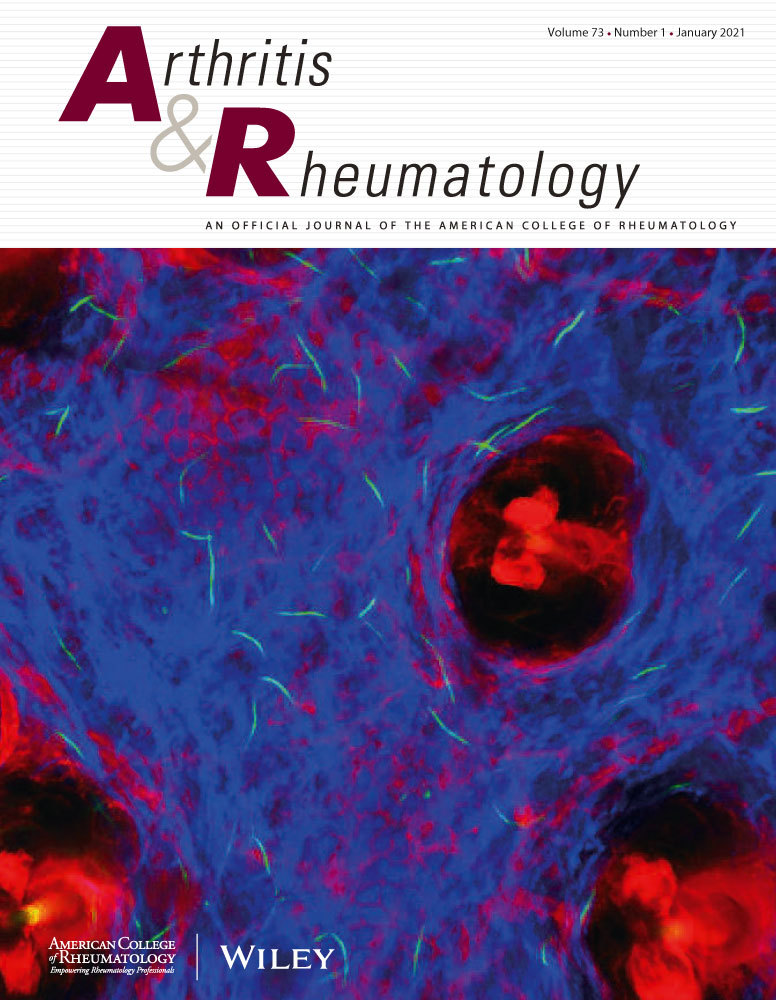Distinct Cancer Risk Profiles in Patients with Systemic Sclerosis with Autoantibody Stratification.
IF 10.9
1区 医学
Q1 RHEUMATOLOGY
引用次数: 0
Abstract
BACKGROUND/PURPOSE Patients with systemic sclerosis (SSc) face increased cancer risk compared to the general population, yet current evidence on specific cancer patterns and their relationship to autoantibody status remains poorly characterized. This study seeks to evaluate cancer risk patterns in SSc patients and investigate associations between specific autoantibodies and cancer development. METHODS This multi-center cohort study analyzed 5-year cancer incidences in 66,637 adults with SSc versus matched controls with seborrheic keratosis using electronic medical records from 128 healthcare organizations (from 2014-2024). Patients were stratified by autoantibody status (RNA polymerase III, anti-centromere, or anti-Scl-70) where available. Primary outcomes included 5-year incidences of hematologic and solid-organ cancers, with hazard ratios (HRs) calculated via Cox proportional hazards regression. RESULTS SSc patients demonstrated elevated 5-year all-type cancer risk (HR 1.17; 95% CI 1.11-1.23). Hematologic cancer risk was significantly increased (HR 1.68; 95% CI 1.50-1.88), particularly for multiple myeloma (HR 2.13; 95% CI 1.61-2.81) and myelodysplastic syndromes (HR 2.03; 95% CI 1.49-2.77). For solid organ cancers (HR 1.23; 95% CI 1.16-1.31), esophageal cancer showed the highest risk (HR 3.96; 95% CI 2.36-6.65), followed by lung cancer (HR 2.32; 95% CI 2.00-2.69). Among autoantibody subgroups, anti-Scl-70 positive patients showed increased overall cancer risk (HR 1.40; 95% CI 1.03-1.92), RNA Polymerase III positive patients had higher rates of hematologic cancers (HR 2.20; 95% CI 1.10-4.28), while anti-centromere positive patients demonstrated no increased cancer risks. CONCLUSION SSc patients demonstrate significantly increased risks for both hematologic and solid organ cancers, with risk profiles varying by autoantibody status. These findings suggest the need for targeted cancer screening strategies in SSc and further research to confirm the generalizability of these findings.自身抗体分层在系统性硬化症患者中的独特癌症风险概况
背景/目的与一般人群相比,系统性硬化症(SSc)患者面临更高的癌症风险,但目前关于特定癌症模式及其与自身抗体状态关系的证据仍然缺乏特征。本研究旨在评估SSc患者的癌症风险模式,并调查特异性自身抗体与癌症发展之间的关系。方法:本多中心队列研究使用来自128个医疗机构的电子病历(2014-2024年),分析66,637名SSc成人与匹配对照组脂溢性角化病患者的5年癌症发病率。根据自身抗体状态(RNA聚合酶III、抗着丝粒或抗scl -70)对患者进行分层。主要结局包括血液学和实体器官癌的5年发病率,通过Cox比例风险回归计算风险比(hr)。结果sssc患者5年全型癌风险升高(HR 1.17;95% ci 1.11-1.23)。血液癌风险显著增加(HR 1.68;95% CI 1.50-1.88),尤其是多发性骨髓瘤(HR 2.13;95% CI 1.61-2.81)和骨髓增生异常综合征(HR 2.03;95% ci 1.49-2.77)。实体器官癌(HR 1.23;95% CI 1.16-1.31),食管癌的风险最高(HR 3.96;95% CI 2.36-6.65),其次是肺癌(HR 2.32;95% ci 2.00-2.69)。在自身抗体亚组中,抗scl -70阳性患者总体癌症风险增加(HR 1.40;95% CI 1.03-1.92), RNA聚合酶III阳性患者的血液癌发生率较高(HR 2.20;95% CI 1.10-4.28),而抗着丝粒阳性患者的癌症风险没有增加。结论:ssc患者患血液学和实体器官癌的风险显著增加,其风险概况因自身抗体状态而异。这些发现表明,SSc需要有针对性的癌症筛查策略,并需要进一步的研究来证实这些发现的普遍性。
本文章由计算机程序翻译,如有差异,请以英文原文为准。
求助全文
约1分钟内获得全文
求助全文
来源期刊

Arthritis & Rheumatology
RHEUMATOLOGY-
CiteScore
20.90
自引率
3.00%
发文量
371
期刊介绍:
Arthritis & Rheumatology is the official journal of the American College of Rheumatology and focuses on the natural history, pathophysiology, treatment, and outcome of rheumatic diseases. It is a peer-reviewed publication that aims to provide the highest quality basic and clinical research in this field. The journal covers a wide range of investigative areas and also includes review articles, editorials, and educational material for researchers and clinicians. Being recognized as a leading research journal in rheumatology, Arthritis & Rheumatology serves the global community of rheumatology investigators and clinicians.
 求助内容:
求助内容: 应助结果提醒方式:
应助结果提醒方式:


